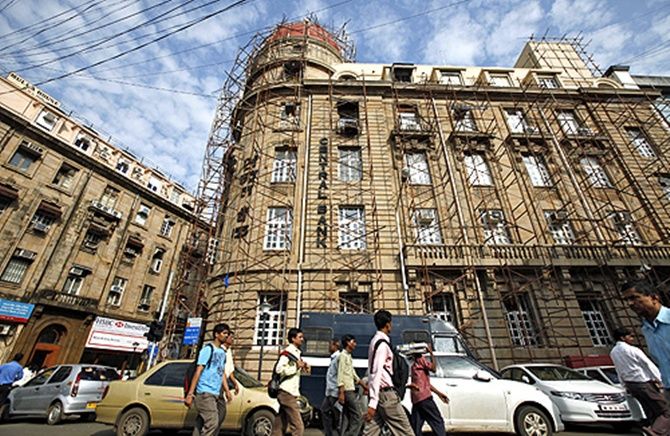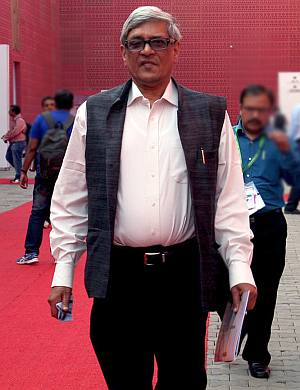'The disease is we have models that are still based on debt and not equity.'
'And banks are singularly not equipped to lend for longer duration projects, which often take 20 years.'
'What happens when you get into a business cycle-like situation in the downward spiral, when the revenue projections of the private sector go haywire?'
NITI member Dr Bibek Debroy shares his concerns about the Indian economy with Prasanna D Zore/Rediff.com
- Part I in the The State of The Economy series: 'The Indian economy has a natural resilience'

How do you read the IIP (the Index for Industrial Production which shrank 1.3 per cent in December) and CPI (the Consumer Price Inflation which accelerated to 5.69 per cent in January) numbers released last Friday? Isn't that bad news for the Indian economy?
These numbers depend a little bit on your benchmark because everything is a little bit relative. I don't think it is correct to say that (these) numbers are bad. It is correct to say that the numbers could have been better.
If you look at the IIP, do remember that there is a slight lack of consistency; it is not very clear why this is happening because the IIP base is an old one; it's a 2004-2005 base. Whereas, the (calculation of) GDP has a 2011-2012 base. Base does not mean base per se; it's also that the items and weights are different.
So, I don't think it is fair to say that the numbers are bad. Depends on which number you are looking at.
What are the tailwinds and headwinds facing the Indian economy today?
One issue is investments. But here too public investments are looking up; private investments are not looking up that much as yet. But partly that is the function of the fact that in the private sector there is lot of excess capacity.
Also, private investments probably react with a time lag.
The two other issues are what do you do about public sector banks. NPAs are more a symptom than the disease itself. Something needs to be done about the PSU (banks).
What's the disease then?
The disease, for the infrastructure sector in particular, is we have models that are still based on debt and not equity. And banks are singularly not equipped to lend for longer duration projects, which often take 20 years.
What happens when you get into a business cycle-like situation in the downward spiral, when the revenue projections of the private sector go haywire?
Coming back to the issues facing the Indian economy the other is the state of the agriculture/rural sector. I think these two are the most important reasons to worry.
Also, India is not immune from the rest of the world. And the flip side is we do not have as benign an environment that we used to have in the good old days of growth.
What should India do to step on the pedal to achieve double digit growth that we have been dreaming about?
I don't think you can get to the double digit number in a hurry because the global environment is not very helpful.
Also, double digit growth for India is too early until the global economy recovers.
I think another way of expressing it -- and here I am not getting into the old-versus-new GDP (series) because that is a pointless debate at a certain level... but whichever series we use the growth rate is increasing by about 0.5 per cent per annum.
The issue is that can one enhance that from 0.5 per cent to one per cent? That's the issue. If we say 7.5 (per cent, this year) normally next year it would be 8 per cent.
Is there any way to enhance it from 7.5 per cent to 8.5 per cent?
Three things the government must, must, must do to get the Indian economy on a firm footing.

I think the agriculture/rural sector and public sector banks issue are the two things that need to be sorted out.
The other things you see are already part of the agenda, but you must remember that several of the things now are the problems of the states.
So when you say the 'government', you implicitly mean the (Union) government in Delhi. But many things, including something like Make In India, happen at the level of the state governments.
Prime Minister Modi during his speech at the Make In India launch categorically said 'We will not resort to retrospective taxation.' Do you think this issue holds global investors back from investing in India?
I think that is a perceptional issue.
With retrospective taxation there are two kinds of issues. One is the major one, which is will we have retrospective taxation? And the answer to this is 'no'.
The other one is on the basis of what we have done earlier (during the UPA regime). There are a few cases which are winding their ways through the judicial process. And they will continue to wind their ways through the judicial process. You cannot sort of suddenly decide on closure.
What's your assessment of this year's GDP growth number?
In 2015-2016, I'd say (we will grow at) 7.5 per cent.
Everybody is talking about 7 to 7.1 per cent? Why do you think it will be 7.5 per cent?
Because public investments have definitely picked up; not yet the private sector investments.












 © 2025
© 2025